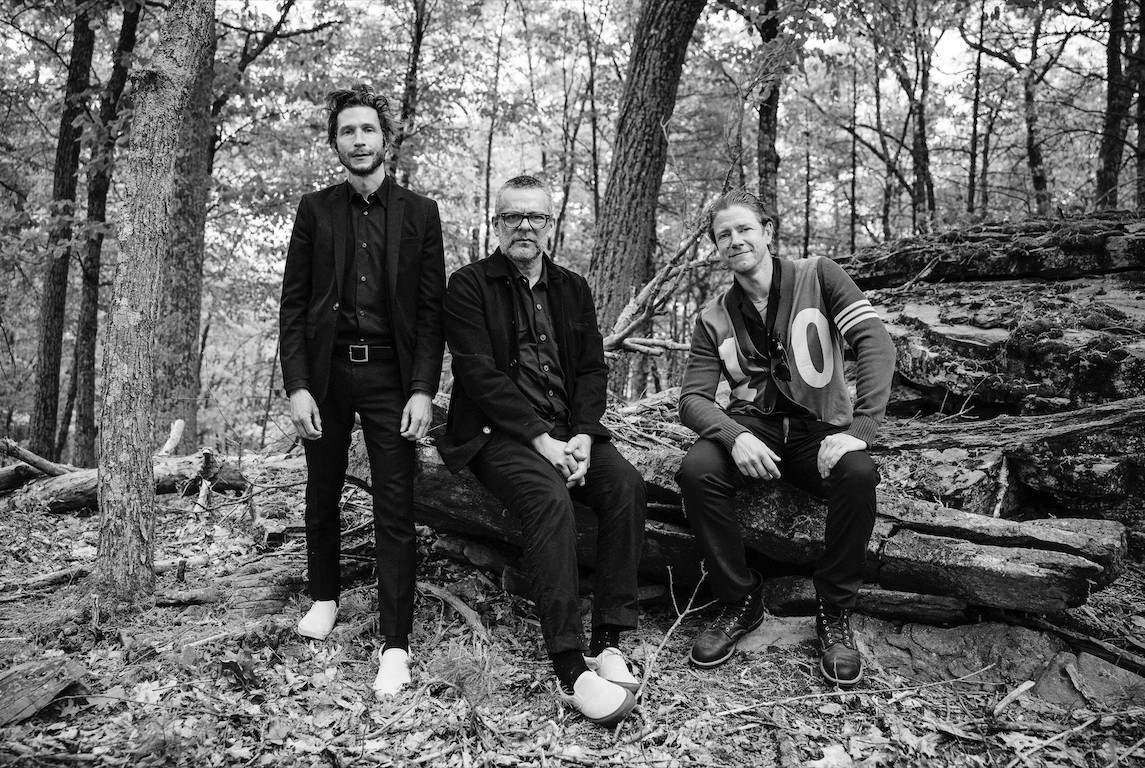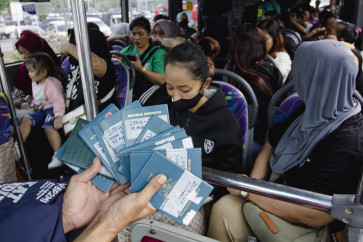Popular Reads
Top Results
Can't find what you're looking for?
View all search resultsPopular Reads
Top Results
Can't find what you're looking for?
View all search resultsExclusive interview: New York band Interpol bares its DNA on new album
Interpol’s Sam Fogarino tells The Jakarta Post about the importance of trust during recording and the “quintessence” of the band's sound.
Change text size
Gift Premium Articles
to Anyone

I
nterpol’s Sam Fogarino tells The Jakarta Post about the importance of trust during recording and the ‘quintessence’ of the band’s sound.
On July 15, New York rock band Interpol introduced the entirety of its seventh studio album The Other Side of Make-Believe, six months after it first teased the opening plinking piano notes to “Toni”.
Unlike its immediate, sonically busier predecessor, Marauder (2018), The Other Side of Make-Believe is a softer, sparser yet more complete record with an overarching feeling of familiarity that is reminiscent of the earliest releases.
Working with producers
“I view it as a ‘one long movement’. Because Marauder was when we first started to work with a producer,” Sam Fogarino, the drummer of the band, told The Jakarta Post on July 29.
“[It was] his say, 100 percent. He had the final say [for the album],” Fogarino added, referring to New York-based producer Dave Fridmann who helmed the band’s sixth studio album.
“That’s what’s cool [about] working with producers. It’s easy to travel down a road that you think is brilliant, and it [turns out as] self-indulgent. You can’t self-edit.”
Up until its fifth studio album El Pintor, Interpol had been producing records alone, with only the help of audio engineers.
“We really stretched them in their role to be vocal about their opinion and you realize, at a certain point, that makes them a producer. The gentleman who did El Pintor, he would say ‘I can’t answer that question because that would mean I’m producing your album, and I really don’t want to do that’,” Fogarino snickered after imitating the engineer.
“It was a really good exercise in trust,” he then noted. “Somebody that you’ve hired, that you know knows how to make records and to go with his ways, his methods. Just by operating as Interpol in that realm, and feeling safe that we did it with Dave, it laid the grounds to wanting to work with Flood,” said Fogarino, referring to Mark Ellis, a British record producer popularly known by his pseudonym: Flood.
Flood, along with Alan Moulder, worked with the band as the producers for The Other Side of Make Believe.
“I don’t know if we would’ve been prepared enough, if we make this record without making Marauder,” reminisced Fogarino. “Neither of them really changed anything too much. They made things better.”
“It’s funny because Dave had sped everything up and Flood had slowed everything down, and they both had merit too.” Fogarino admitted that he had found it harder to play slower, as “there’s a natural tendency to speed things up, it’s a very emotional thing”.

Sonic correspondence
While the album was recorded in London, the songwriting process had started in the summer of 2020, back when the COVID-19 lockdowns began. The band started writing songs remotely — each of them writing without the others present physically.
“We’ve been playing together for so long, that if we can’t conjure that vibe now when we’re not together, then it’s not there when we are together.”
“I would like to try the remote process again. [...] It was almost a way to become a hyper version of yourself. Because you have so much more time,” claimed Fogarino, regarding whether the remote songwriting process would still be an option in the future.
“When you’re not combating each other or being overly inspired, you can take different paths. You’re not playing as hard, so it’s easier to rhythmically really hone-in on the feel. Because that’s all you have, you just hear a playback of the other parts.” By the time that any of the personnel would bring forth an idea, it was very well-realized.
While the remote songwriting process could prove to be a bit restricting, it did open a new horizon for the band. Paul Banks, Interpol’s lead vocals and guitarist, noted, as recalled by Fogarino, that the process helped him to explore different versions of his voice, as, in contrast to their collective songwriting process, Paul was not shouting and straining to hear himself.
“I think it’s definitely something that we’ll definitely spring from.”
The quintessence
Fogarino noted that the band’s general notion in defining its sound is that they could do whatever they want, while acknowledging as well that there is a certain boundary within which the creative freedom really applies.
“There’s this gravitation towards atmospheric and really driving rhythms. I think that those are the things that ultimately dictate what could be an ‘Interpol song’. [...] Like a grand sense of atmosphere that has this ‘otherness’.”
“The quintessential version of that on the new album is ‘Go Easy (Palermo)’,” said Fogarino. “This band, with all its experience, is the same band that did ‘Untitled’ on the first album. Now here they are, 24 years after the song was written. I think it has the same quintessence. That same sense of atmosphere and longing. [...] For such a short song, we worked on it really hard.”
“I don’t know what it would be”, answered Fogarino when asked whether they have found any songs from the new album that are less suitable for a live setting. “We played ‘Into the Night’ live, and that would’ve been my guess. But it’s almost better, a little more exciting. We were all surprised. ‘We wrote this?’ There’s a certain menace to it that’s not really found in any other Interpol track.”
He also thought that Daniel’s guitar lines for the song could even translate, almost, into classic rock.
“[Try] different players and different rigs. Like a Les Paul going through a Marshall, that would be very Jimmy Page, and I think we all got a kick out of that. It’s still Interpol, but yeah, it’s a far cry from ‘PDA’ [laugh].”









